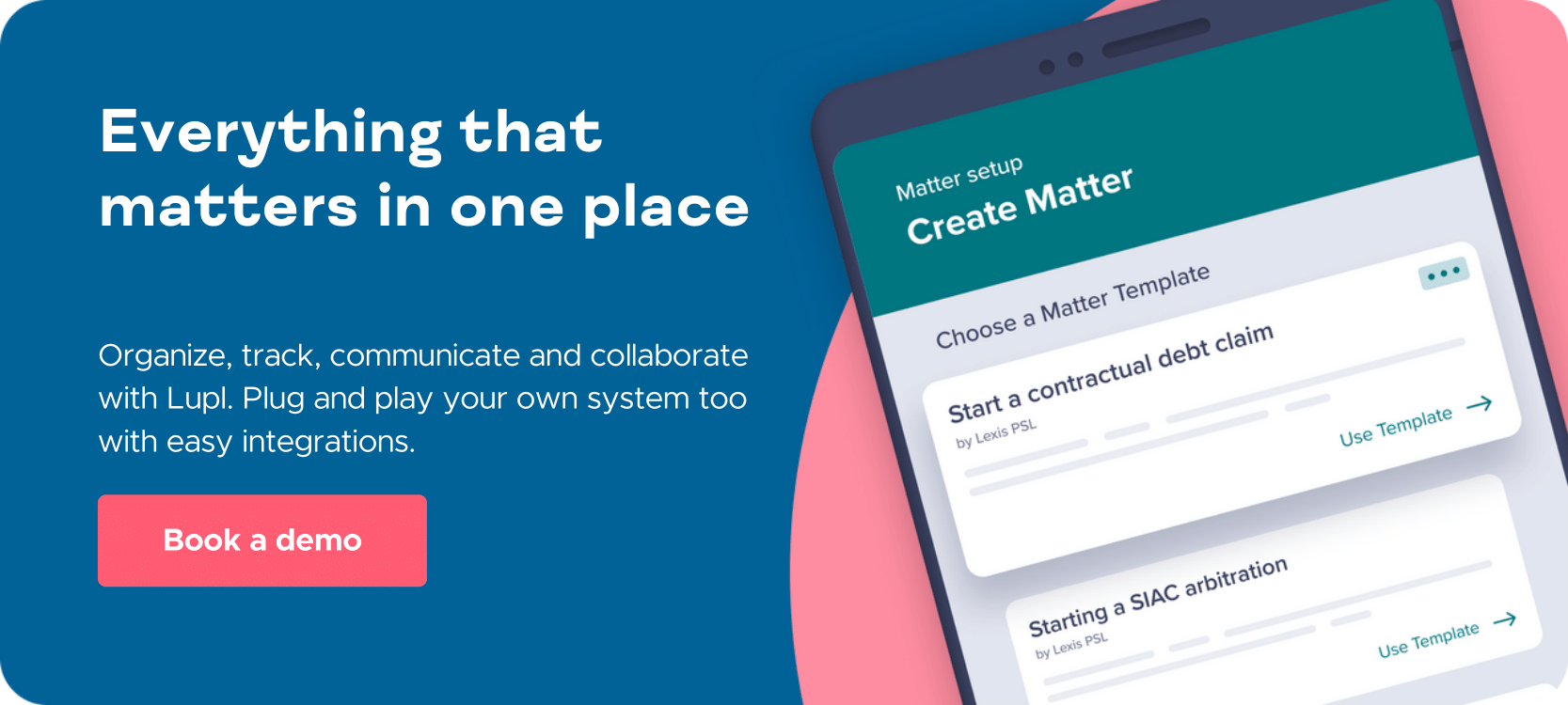How 10,000 Lawyers Redefined Legal Collaboration

You know what it’s like when a new app is added to your tech stack. It’s meant to enhance collaboration, but somehow makes the whole process more frustrating. Or, worse, after using it for a while it ends up sitting there, unused.
Often this happens because the people creating tools for lawyers aren’t lawyers themselves. Even though it seems like a no-brainer that they should be, right?
We thought so too, and that’s how Lupl came about. A group of lawyers brought the idea to life after hundreds of hours of conversations with legal teams and law firms from all over the world — talking with a group that represented 10,000 lawyers. Time and again, we found that the same pain points emerged. We knew we could help and that’s exactly what we’ve been doing. It’s the reason we’re here today.
Read on for the story of how three law firms became a group representing thousands, and how that group is redefining what legal collaboration means.
Ready to get started? To see for yourself how Lupl’s legal project management platform is redefining legal collaboration, book a demo today.
Where it began
Lupl started as a conversation. Lawyers from Rajah & Tann Asia, CMS and Cooley (three of the largest law firms in the world) recognised that the same issues kept coming up — from clients, colleagues and outside counsel. So in 2018, these lawyers found each other and started to talk.
Collaboration in the legal industry just wasn’t cutting it, and people felt like it had the potential to be so much more — to streamline processes, save time and, above all, deliver for clients.
Common tasks that should be simple to execute — such as document sharing, status tracking, knowledge and project management — were more difficult than they needed to be. Tech stacks were bloated and the process of managing legal matters was spread across numerous different tools, systems and interfaces. Far from helping processes, tech tools often made things worse. And as the tech stack bloated, the problems bloated too.
Recognizing that an industry-wide problem would require an industry-wide solution, the three law firms set out to change the system and take legal tech to new heights. They pooled resources, put in place an Advisory Board and Law Firm Working Group, and spent thousands of hours talking to the only people that could truly help — other lawyers.
From this, Lupl was born.

Listening to the lawyers
Six months of conversations happened before a single line of code was written. We had conversations that explored the technical frustrations of people across the entire legal spectrum. We wanted to figure out what was making peoples’ lives difficult, what was working, and what people wanted.
All this research found that no matter where lawyers practice, from a small legal department to a large law firm, common pain points existed and consistently disrupted workflow.
We listened, and this is what we heard.
The challenges of legal tech
Collaboration wasn’t working
Collaboration wasn’t where it needed to be. There were too many different types of systems that couldn’t be used together — which meant disjointed, stop-start communication instead of one smooth, connected process that flowed from start to finish.
This cost time and that cost money (in countless non-billable hours). Overall, it was harder and took longer to reach the standard of work that clients expect than it should, resulting in sub-par working conditions and frustrated clients.
Email, email, email…
Email has its place. But, even before we started talking to lawyers, it was clear that email isn’t the collaboration tool for the 21st century, and doesn’t leave much room for increased efficiency. Lawyers were trawling through email threads to find one piece of information, were emailing asking for updates, emailing to correspond with outside counsel, email, email, email… and it wasn’t working.
Ease of sharing
Easy information sharing was the promise of the internet, but legal tech must have missed that memo. Scrolling through folders across multiple systems to find that elusive nugget of information, opening and creating doc after doc, continuously sharing project checklists back and forth over email — sound familiar?
Information gatekeepers occurred accidentally and anonymously. Knowledge and know-how was being kept in information silos instead of shared across the network simply because of how the system was set up.
This made information sharing a cumbersome, unclear and complex process which added time while harming the quality of work output — the opposite of what it should be.
Security? What security?
Connected to the difficulties of collaboration, trying to keep a disparate and disconnected tech stack secure can feel like filling a leaky bucket with water.
There were vulnerabilities, through loose ends like unsecured email chains and in human error when switching from app to app. Without a focus on security, the risk of a data breach moved closer to a ‘when’ rather than an ‘if’.
Redefining what collaboration can be
Helping as this was, we didn’t need to talk to a group that represented 10,000 lawyers to see that legal tech was lagging behind other industries. We, and everyone else, could see this in their day-to-day.
In fact, half of all respondents to a survey on legal tech said they lacked the relative knowledge or familiarity with available technologies, and a further 39% said there wasn’t enough time devoted to learning how to use new tech.1
The message was clear: legal collaboration, and the tools used to do it, had to improve.
Lawyers needed practical solutions to meet these challenges. Thankfully, this is changing now. Venture capital investments in legal tech passed $1bn in 2021,2 and LawtechUK estimates that the increased use of tech in law firms could bring up to £1.7bn in overall productivity gains.3 With increasing investment and tools like Lupl, we’re helping lead the legal industry in redefining what legal collaboration can be.

Matching solutions to challenges
After taking the time to truly understand the issues that the legal industry faced, we then had to rise to the challenge of providing the right solutions. Based on the feedback from six months of research, we built prototypes that were sent around the world to be stress tested again and again by as many lawyers as we could reach. This was co-development in every sense.
Matter templates
Legal project management and matter management needed to be streamlined and unified. Collaboration, information and communication needed to take place in one place. It also needed to be accessible by everyone who needs to access it, whenever they need to.
To enable this, we produced matter templates: pre-built legal matters that lets you store, edit and access all the key tasks, deadlines, documents, resources and knowledge (in a word, everything), all in a single place.
Matter templates help:
- Put legal knowledge in users’ hands: Users can utilize standard templates for common cases, but create custom templates too, to capture all information and make it easy to share.
- Facilitate legal project management: By enhancing information sharing and collaboration and keeping everything in one place, processes are simplified, unified and accessible.
- Save time: You don’t have to spend hours hunting everything down or briefing team members to get your matter underway – you’ll be up and running in a few seconds.
Sharing is caring
To improve efficiency we wanted to unite all those towering tech stacks and provide one simple, intuitive legal project management process instead. This would help improve sharing across law firms, legal departments and outside counsel, save time, improve visibility, transparency, and communication across all levels of employees.
To do this, we included:
- Integrations upon integrations: By unifying sprawling legal tech, users don’t have to move out of one app into another, making the process of sharing — and the security of it — easy. Use all your tools in one place.
- Plug and play: Users can get set up in less than a minute, creating matters and inviting people into them, creating one space in which sharing is easy as soon as the platform is set up.
Security by Design
Just by using Lupl you’re already drastically reducing the risk of leaks. But by making sure our software was created with security as a foundation and is SOC2 accredited, it doesn’t just help reduce the vulnerabilities of email but also increases the confidence of legal firms in sharing across their organization.
And, for extra peace of mind, just before you send something or share information with someone, a notification also pops up in Lupl to remind you who you’re about to share with.
Overall, our main goal was to improve collaboration and communication. But focusing on this, Lupl, like all good tech that provides a simple solution to sprawling challenges, is a force multiplier.
This means that Lupl helps produce macro impacts from micro innovations. We figured that by focusing on giving your employees the right tools for the job so their day runs smoothly would result in massive gains for productivity and satisfaction. And we were right.
Making it a reality
After settling on our solutions and a successful proof of concept phase, we got to work with Yonder, a software and tech development consultancy, and Frogslayer, a software design and development firm. We wanted to create a professional, easy to use software solution to all the problems we’d identified.
Staying in the loop
It was in this process that we decided on the name: Lupl, inspired by staying in the loop. In a legal world where it’s difficult to see who is doing what and how everything is going, we keep you in the loop.
This is more than just a goal, it’s our MO. It defines who we are and what we do. As a frontrunner of legal tech, we knew we had to get it right because we know the potential that getting it right holds — not just for individual lawyers, but for the industry as a whole.
And now, because we truly listened to the people who will use it, Lupl’s not just the official partner for the Singaporean Ministry of Law, we’re also leading a transformation in legal tech.
Early adopters of Lupl — known as the LTP in Singapore — know that we make everything easy. Unlike other tech platforms, which require time and effort in figuring out if they’re right for your firm (and then even further time, effort and cost in retraining staff), Lupl takes just 57 seconds to set up and get started.
No more wasted hours of training, no more fortunes spent on tech, just one simple process.
Transforming how legal works
We started off by listening and that’s what we still do. Our APIs are open and, as a business, so are we. Because we’re a platform built by lawyers for lawyers, it’s important to us that we’re continually improving Lupl to match the needs of the lawyers that helped build it. We’re constantly creating new and secure integrations with the tools you use everyday, like WhatsApp, SharePoint, Slack, Zoom, and Teams.
Most importantly, we’re continually redefining what it means to collaborate in the legal world. We want to make sure that our tech works as efficiently and seamlessly as possible so that you can focus on the important stuff.
Like with any new tech that makes processes seem simple, you might ask: ‘Why hasn’t it always been this way?’ Well, now it can be. Book a demo today.

1 Ideas for improving legal tech adoption as investment in training lags behind tools | Apperio
2 Legal Tech Makes Its Case With Venture Capitalists, Tops $1B In Funding This Year
More legal tech insights we think you'll love

Q2 2024 Product Update – New Features & Improvement
Lupl is the leading task and project management solution for...

How a team of trainee lawyers streamlined work handovers with Lupl
CMS trainees adopt Lupl's task management tools to enhance work...

